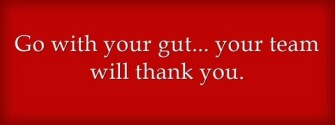
In Warren Bennis’s On Becoming a Leader, he states, “a part of whole-brain thinking includes learning to trust what Emerson called the ‘blessed impulse,’ the hunch, the vision that shows you in a flash the absolutely right thing to do. Everyone has these visions; leaders learn to trust them.”
In my time as an educator, I’ve had these “blessed impulses,” but it has taken me a long time to trust them. In the classroom, I never felt like I did enough, and it wasn’t until about seven years into my teaching career that I started taking major risks that diverged from what conventional thinking and practice seemed to be doing in the buildings I was in, but it felt right.
As a matter of fact, when I had these hunches earlier in my career, I disregarded them, terribly afraid that my mistakes would haunt me forever. So I played it safe, ignoring impulses that may have gotten me to where I am now, faster.
Each of us has that moment in our career where we recognize that what we are doing is either working or not, and we make a decision to do something about it or not. This crossroads is one that happens on many levels; not just the big stuff, but often the small choices we make sometimes even despite the counsel we get from others.
Now as a leader, my hunches make different waves. They no longer only influence the 150 students I saw in any given year, but instead first impact 44 educators and their collective classrooms of students. Fortunately, although I may be green in my new capacity, I’m not new to education anymore. I know what good pedagogy looks like, and even more importantly I know what good learning looks like, and I’m not afraid to assert it the way I may have been in the beginning of my career.
This conviction is what drives me to trust my hunches, especially when I haven’t derived all of the support I need from all of the stakeholders to start addressing change. Change is tricky and sometimes it must happen even if some are dragging their feet.
Starting my journey in this position has been an interesting mix of trusting my hunches, going more slowly than I’d like, really being attentive to the needs of those who have been here longer and trying my best to observe clearly and objectively what needs to be done. I won’t and can’t be everyone’s friend all of the time, and having an office instead of a classroom already creates a different dynamic. Before, I was used to working with “change” from within the rank and file. I was one of them.
That is no longer the case.
However, in my heart, I will always be a classroom teacher, vehemently committed to the learning needs of all children, and that’s why my “blessed impulses” will always matter regardless of the capacity I serve students in.
As educators and leaders, we have a responsibility to trust our instincts. Although we may have come to this profession for different reasons, we are united in why we stay... the students. Being the kind of leader who inspires teachers to continue to push forward through the discomfort of change for the benefit of all student learning is what we must strive to be.
So if you get a funny feeling in your gut that you can’t explain, but it nags at you in a way that potentially can keep you up at night, don’t ignore it. Believe that you know what is best, even if the path from the decision is not clearly delineated yet. Circumstances have a funny way of working themselves out when the decisions being made are for the right reasons. We must learn to stay the course or jump ship when the timing feels right and while the benefits thrive.
When was the last time you had to trust your gut and what was the outcome? Please share.